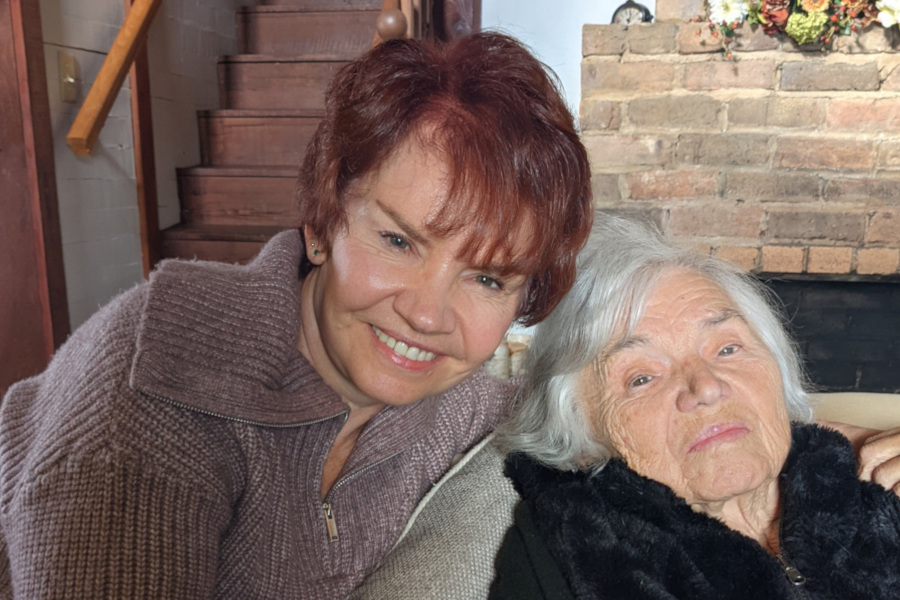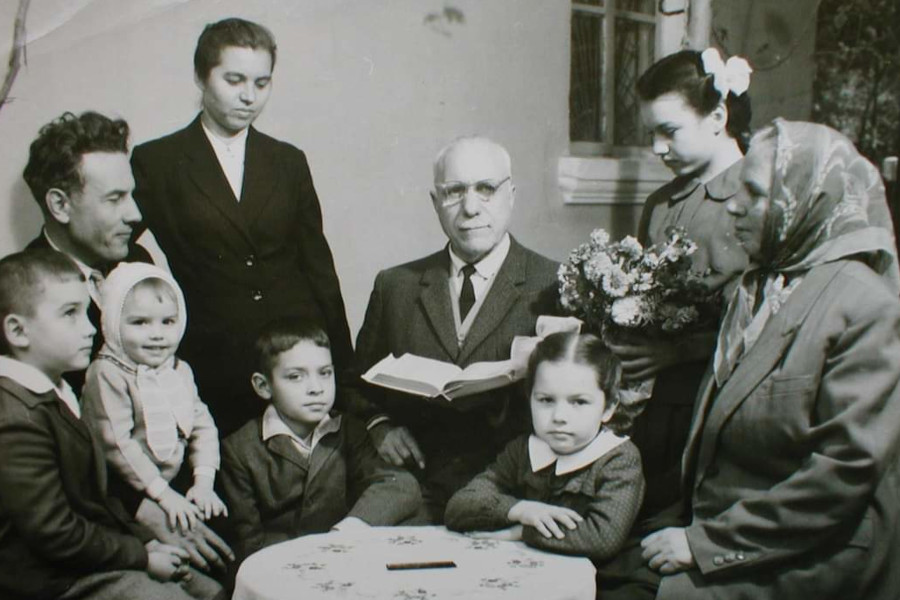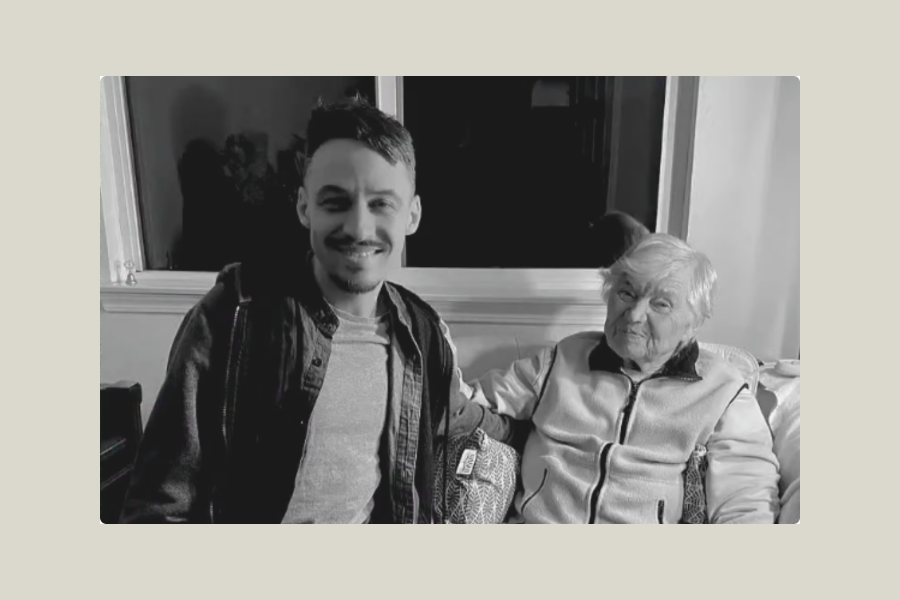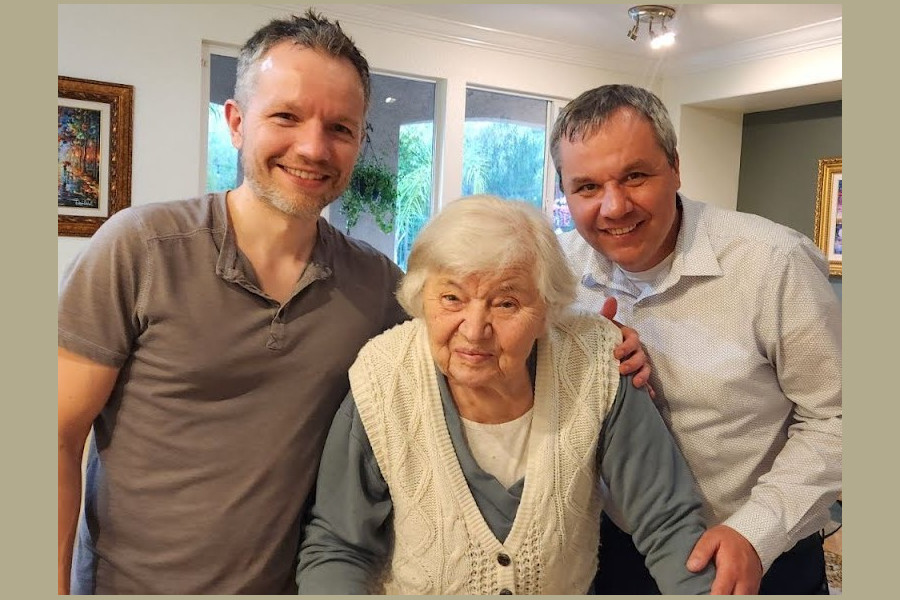Anna Ivanovna Kulakova: A Eulogy
July 25, 1933 — June 14, 2025
by Konstantin Kulakov

(In Loving Memory of my Mom)
Here you are no more, Mom… You were my rock, my inspiration, and an endless source of love. Just yesterday, your voice filled our home with warmth, and today I’m trying to piece together all our memories: the taste of your borsch, the comfort of your hands, your kind smile. Thank you for every story by the soft glow of the lamp at night, for your patience as you taught me everything, and for the strength with which you weathered life’s storms. Your faith and wisdom live on in me and in every day I now cherish twice as much. May you rest in peace, Mom. I will keep you in my heart always and never let your love fade.

"I am grateful to have had such a caring and devoted Mama, who raised six children—three sons and three daughters. My Mama was the one who mended our torn socks, cooked for all of us on a humble stove, washed our clothes and bed linens by hand, and hung them to dry on long ropes in our backyard. She knelt in prayer with us on the front porch before sending us to a communist school, and during church services, she kept all six of us together on a single long bench. She will forever be remembered as a loving Mama who always put her family first." by Peter Kulakov

July 25, 1933 — June 14, 2025
by Konstantin Kulakov
"In my last memory of grandma, it is evening, I am in California, and
grandma is worried that I don’t have a coat. We spent the past hour
talking about family, Pushkin, prayer. After dinner, she tells aunt Elana,
“someone get him a coat.” When I approach her bed, she laughs—with
her usual gravel-toned tenor—and says I was worried you were cold.
Then she squints a little and exclaims, “what is this mustache?
Immediately, shave this mustache.”
In my first memory of grandma, I am running up a flight of cement stairs
and their chalky scent is comfort. I am in Zaoksky and maybe four years
old. In this memory, two, beautiful faces hold my attention: the face of my
mother, and the face of my grandmother. In this memory, my mother
would open our door and I would run up the stairwell, from one floor to
the other, suspended between two worlds.
I am running up the stairs because, at the top of those stairs, a door
would open, and backlit by afternoon light, stood grandma. It was the
right apartment because a Persian-style rug hung from the wall and a
beautiful woman placed a pair of slippers on the parquet floor. It was
grandma’s apartment because I would see 3-liter jars full of milk, a
cheesecloth at the rim.
I didn’t know what took me to grandma, but I always felt better in the
patterned, carpeted stillness of her home. Some core need was always
met. How this need was met always felt utterly new. It astonished me. I
still remember the birthday her and grandpa handed me my present. I
was disappointed that it was only a factory-wrapped confection, but the
moment I grasped the plastic, I realized something strange. The
packaging was heavy, sturdy. Inside: a metallic car, shining.
After we returned to Russia, I was a little older and began to see another
side to grandma: Grandma The Disciplinarian. I was taught how to sit,
where to put my feet, and how to stand with authority, without hunching
my back. These were difficult years in our relationship. I remember one
day in the winter, I caught a bronchial cold. We were walking down the
street when she instructed me to not run so as not to get sweaty, but I
found a piece of ice to kick and ran after it. Grandma handed me over
to the discipline of grandpa.
Grandma wanted to keep me safe. She protected life because she
valued life, knew that it was fragile. My father also knew this and told us
the story of grandma throwing rocks near the train tracks, alerting him of
the oncoming train. This was not because grandma was overly stern or
opposed to playfulness. This tough spirit was survival, protection. Any
hardness in her character only emerged, in precise proportion, to the
brutality of the world.
In Oceanside California, grandma broke into blossom, grew young. She
cultivated roses and showed everyone a photo of grandpa and her
beside a deer. She loved the English phrase “I love you” and she would
use this phrase often, especially with my girlfriend Simthana. There was
only one word she hated in English “GOD.” “Oh I hate how they say
“Gad.” How do you associate our heavenly Father with a vile reptile?
In America, grandma studied for her citizenship test and ached for 3-liter
jars of still-warm cow milk. She watched Russian television, voted for
Obama. During her stay at our home in Maryland, she had one mission:
to be relentlessly helpful, to make sure I am fed with borscht, katleti, and
porridge, of course, of the perfect consistency. And to ensure that I
moved through the world with reverence, that I never hunch my back.
The years grandma became most present—most memorable to me—
was the years after we lost grandpa. She taught me many things, but
mainly, she taught me the difficult work of grief. She knew that in addition
to comforting someone, there was a more difficult task. This task was
lifelong. It was the task of accepting comfort, of accepting love. I still
remember, decades ago, after her mother’s death, we drove down
muddy roads in Zaoksky. She wept. Grandpa pulled her towards him.
In the years I lived in New York, I started to call her often, read her my
poems, told her about my publications and awards. She had nothing
positive to say, said they didn’t rhyme. I was frustrated and our calls
decreased. I couldn’t understand why she would never praise my work
the way grandpa did. I do remember how one evening—standing in the
doorway of my parent’s bedroom—she said about my poems “a prophet
is never acknowledged in his land.”
Years passed—and as with all resentments—I tired of holding it. I
remember I was in California and I could not wait to see her. My friend
was driving me through the sun-drenched orange groves to my aunt’s
home near Redlands. It was December, 2022. After I crossed the path of
a large bull dog, I approached her room. She sat holding a walker,
undisturbed. In spite of her dementia, she recognized me—her voice
robust, gravel-toned. Her spirit was young. We laughed and hugged,
over and over. I held her silky, worn hands.
The care of those hands is inseparable from the brutality they survived.
Those hands survived arctic wind chills near the Altai mountains. Those
hands survived poverty, war, and famine; survived interrogation and
dislocation. They survived childbirth and transatlantic travel; survived loss
of parent, husband, homeland. To hold those hands was to hold history,
a staircase—that like that staircase to her Zaoksky apartment—stood
between two generations. And on June 14 at 9:01 pm, four days after
my birthday, those hands unclasped for the last time.
It is much easier to recognize who someone is and what they mean to
you by the contours, the imprint, they leave in their absence. For years, I
did not understand the purpose of those difficult talks. All those talks
about my posture, about the coat, about reverence served a purpose.
They were teaching me something. They were teaching me how to
inhabit the world—how to navigate life—without distortions. They were
teaching me how to be——not just a writer—but a human being. They
were teaching me how to age by growing younger.
All week, hot afternoons and rain. (For everything there is a season). I
have opened my window and propped up a small painting of a birch
field. (What gain have the workers from their toil?). I hear grandma’s
gravel-toned voice echo from another room. (A time for every matter
under heaven). I see her place the slippers on the floor. (He has put
eternity into man’s heart). I put my coat on and stand upright (He has
made everything beautiful in its time)."


"So much of my childhood is wrapped in the summers I spent under her care. I can still see us walking those dusty roads in Zaoksky, her hand in mine, stopping by neighbors for eggs, milk, and fresh vegetables. But those walks were never just errands—they were little pilgrimages of kindness. At every doorstep, she offered more than a greeting; she offered warmth, wisdom, and time." by Daniel Romanov